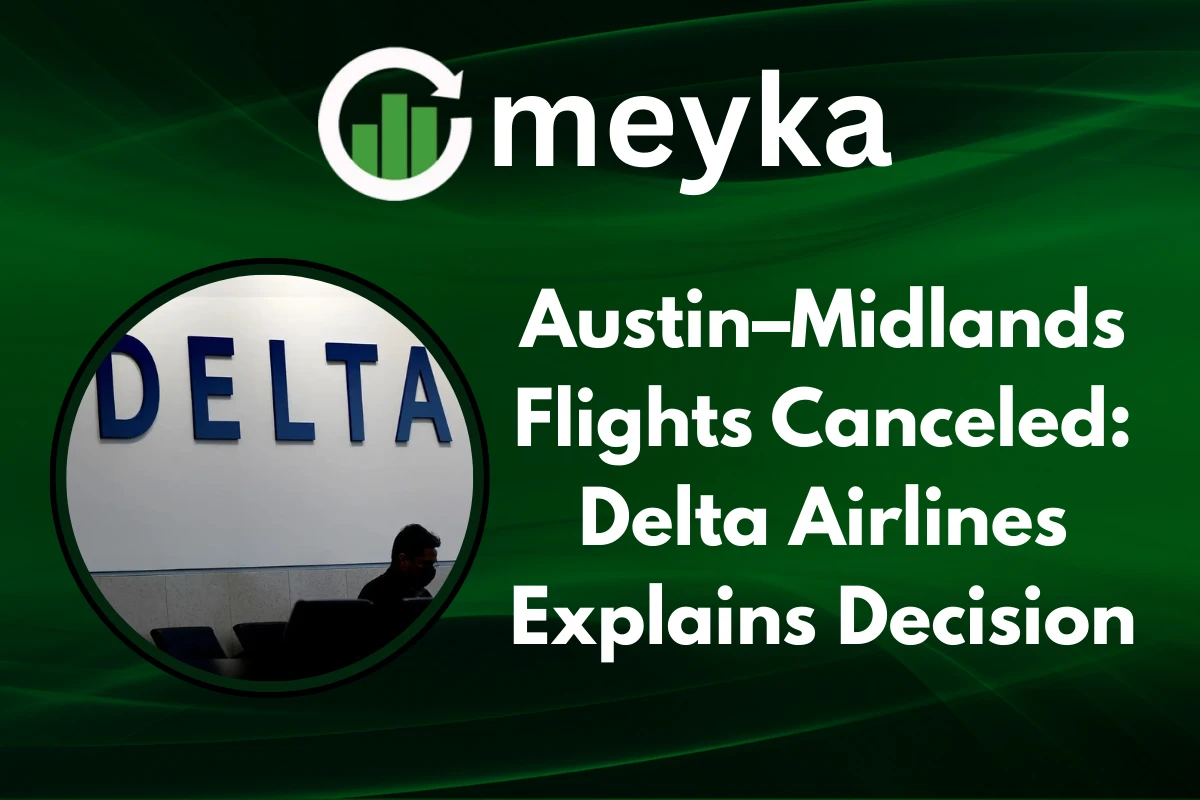Austin–Midlands Flights Canceled: Delta Airlines Explains Decision
Delta Airlines Pulls Out of Austin–Midlands Route
Delta Airlines has officially confirmed that it will end flights between Austin-Bergstrom International Airport (AUS) and Midland International Air & Space Port (MAF) this fall. The decision comes after months of speculation about the route’s sustainability and is directly tied to low passenger demand. According to reports, the average load factor on this route stayed below 60 percent since it began operating in April 2024, which is well below the profitability threshold for most major carriers.
This cancellation will take effect on November 9, 2025, marking the final day that Delta will serve the Midland market. For many travelers in West Texas, this news was disappointing, but Delta executives have stressed that the move is part of a much bigger strategy to strengthen the airline’s presence in Austin, where demand is growing rapidly.
Why Did Delta Airlines Cancel the Route?
The main reason is simple: not enough people were flying. Data from the Department of Transportation revealed that passenger numbers on the Austin–Midlands route remained too low to justify continued service. Average fares also dropped sharply over the past year, from more than $500 round-trip in March 2024 to around $336 in March 2025. While numbers showed slight improvement in demand, they still were not enough for long-term success.
Some aviation experts also suggest that the route may have been used as a placeholder strategy. By keeping a small flight schedule between Austin and Midland, Delta could hold onto valuable gate slots at Austin-Bergstrom, a fast-growing airport where competition for space has been heating up. Once Delta was ready to expand into stronger markets, the Midland route was among the first to be cut.
How Will This Affect Midland and Travelers?
For Midland, the cancellation is significant because it means losing one of the few major carriers connecting the city directly to Austin. With Delta stepping back, Southwest Airlines will remain the only airline operating between the two cities. While this ensures the route is not completely gone, passengers will lose the flexibility of having more than one carrier to choose from.
Local leaders in Midland have expressed concern but also determination to move forward. Councilwoman Robin Poole emphasized that the city is committed to improving its airport facilities and attracting new carriers in the future. This shows that although Delta’s departure is a setback, Midland is looking ahead to long-term growth.
What Is Delta Airlines Doing Instead?
While Delta is ending this specific service, the airline is doubling down on Austin as a growing hub. In fact, Delta recently announced several new nonstop routes from Austin to cities like Denver, Columbus, and Kansas City, along with increased service to San Francisco and Indianapolis. These adjustments reflect the company’s focus on aligning its network with real demand.
Delta is also strengthening its local presence by opening a new flight attendant base in Austin in October. This move shows a clear commitment to Austin as one of its fastest-growing focus cities. In addition, the airline is launching new seasonal international routes from Austin to Cancun, Cabo San Lucas, and Palm Springs, expanding leisure travel options for passengers.
According to industry analysts, these changes are part of CEO Edward Bastian’s strategy to make Delta’s network leaner, smarter, and more profitable by focusing resources where they matter most.
Reactions on Social Media
The cancellation quickly drew attention online, especially among Austin and Midland residents. Marc Mullins, a journalist, reacted on X (formerly Twitter) with a straightforward take:
“Delta Airlines is cutting the Austin–Midland route, and it is a sign of shifting demand in Texas air travel”.
His comment captured the broader industry view that Delta is making a calculated move to secure its long-term position in Austin.
Another notable response came from the Austin Business Journal, which posted on X:
“Delta’s departure from the Austin–Midland route reflects broader changes in Austin-Bergstrom’s evolving flight map”.
This highlights the fact that while one connection is being lost, Austin is gaining stronger links to more competitive destinations.
These social media conversations show that while some passengers are frustrated, many observers recognize that Delta’s decision is part of a larger shift in airline strategy.
Was the Austin–Midlands Route Ever Sustainable?
When Delta first launched the Austin–Midlands service in 2024, it seemed like a promising move to connect the energy-rich Midland region with Texas’s capital city. However, from the very beginning, the route struggled with low passenger demand. Industry reports show that average passenger demand per day each way (PDEW) never reached strong levels. Even when the numbers grew slightly in 2025, the yields were still too weak to sustain the flights profitably.
This reality makes it clear that the route was not sustainable in the long run. With competing airlines focusing on stronger demand corridors, Delta had little choice but to redirect its resources.
What Does This Mean for Austin Airport?
The changes come at a time when Austin-Bergstrom International Airport is itself undergoing major expansion. Under its “Journey With AUS” program, the airport is planning a new arrivals and departures hall along with a new Concourse B that could eventually house up to 40 gates. This expansion reflects the city’s booming population and rising air traffic, making Austin an increasingly valuable hub for carriers like Delta.
Conclusion
In the end, the story of the Austin–Midlands cancellation is less about loss and more about realignment. Delta Airlines made the decision based on clear numbers: low demand, weak yields, and better opportunities elsewhere. The airline is not abandoning Austin; in fact, it is doing the opposite by investing heavily in new routes, a permanent base, and expanded service options.
For Midland, the challenge will be to fill the gap left by Delta and work toward attracting more carriers in the future. For Austin, the shift represents growth, with Delta positioning itself to compete strongly against rivals in one of the nation’s fastest-growing airports.
In simple terms, the move reflects modern airline strategy: cut underperforming routes and put planes where passengers want to fly. As CEO Edward Bastian has emphasized, Delta is reshaping its network for long-term strength. And while some travelers may miss the Austin–Midland link, the broader picture shows a future of expanded opportunities for Austin flyers.
FAQ’S
Yes, Delta Air Lines operates from Austin-Bergstrom International Airport with several domestic and seasonal international routes.
Southwest Airlines currently flies to Midland Odessa; Delta will end its Austin–Midland route in November 2025.
Yes, Delta is opening a new permanent flight attendant base in Austin in October 2025.
Yes, JetBlue has reduced its Austin service significantly, cutting multiple routes in recent years.
Southwest Airlines operates the highest number of flights out of Austin-Bergstrom International Airport.
Delta Air Lines is a U.S.-based airline headquartered in Atlanta, Georgia.
Delta’s main hub and headquarters are at Hartsfield-Jackson Atlanta International Airport.
Delta operates from the Barbara Jordan Terminal at Austin-Bergstrom International Airport.
The military base in Austin is Camp Mabry, a Texas National Guard installation.
Yes, Delta is widely regarded as one of the best U.S. airlines, known for reliability, customer service, and extensive network.
No, Delta does not currently operate flights between Dallas and Austin.
No, Delta is not owned by Virgin, though it holds a minority stake in Virgin Atlantic.
Disclaimer
This content is made for learning only. It is not meant to give financial advice. Always check the facts yourself. Financial decisions need detailed research.






